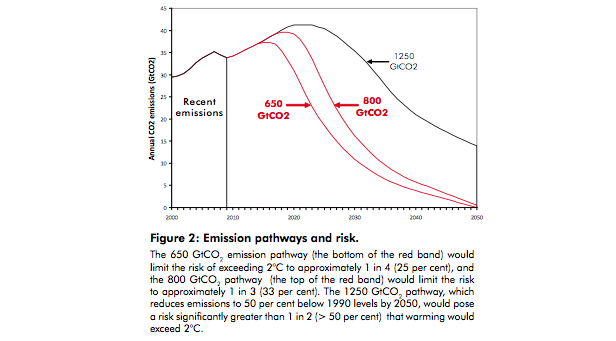Cross-posted from the Wonk Room.
A new scientific report, the Copenhagen Prognosis, outlines the terrible challenge the world faces from climate change — as well as several paths to safety. World leaders in Copenhagen struggled to come to a provisional accord that would provide a framework for sustainable civilization. But a team of the world’s top climate scientists have offered a stinging indictment of the political process, noting that the unofficial commitments made are “not consistent with the expressed political will to protect humanity:”
A broader analysis of tipping points and feedbacks reinforces the conclusion that greenhouse gas (GHG) emission reductions targets currently being tabled within the political realm are not consistent with the expressed political will to protect humanity against high risks of devastating climate impacts and significant risks of self-amplifying global warming.
 The Prognosis indicates that for a “good chance” (75 percent) of avoiding “major societal and environmental disruptions through the rest of the century and beyond … global GHG emissions would almost certainly need to decline extremely rapidly after 2015, and reach essentially zero by midcentury.”
The Prognosis indicates that for a “good chance” (75 percent) of avoiding “major societal and environmental disruptions through the rest of the century and beyond … global GHG emissions would almost certainly need to decline extremely rapidly after 2015, and reach essentially zero by midcentury.”
This is indeed an “almost overwhelming challenge,” but “there is no evidence suggesting it is impossible:”
To the contrary, the growing body of analytical work examining such scenarios at the global and regional level suggest it is not only technically feasible but also economically affordable, even profitable.
It should come as little surprise that a clean-energy economy is not just more sustainable but more profitable than one based on the reckless waste of unrecoverable resources — but economists are just now beginning to recognize that fact.
The Copenhagen Accord reaffirms the goal of limiting warming to less than 2 degrees C above pre-industrial levels, but negotiators jettisoned the target of cutting global warming emissions in half by 2050. Even that goal, the Copenhagen Prognosis finds, is utterly insufficient:

The Copenhagen Prognosis was prepared by top climate scientists, including the Stockholm Environment Institute‘s Sivan Kartha, the Potsdam Institute for Climate Impact Research‘s Hans Joachim Schellnhuber, and was endorsed by IPCC director Rachendra Pachauri’s Energy Resources Institute.
We’ve passed the threshold of safety and security, and each additional ton of carbon, each year emissions rise, each year concentrations do not drop — we are killing people.
We need to separate the science — that we are at unsafe levels of greenhouse gases and our destabilized climate is killing people — from the policy of setting deadlines and targets.
We know that any deadline or target to eradicate hunger and poverty is insufficient, but we make them anyway. We need the same understanding with climate change.


